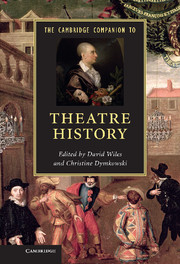5 - Classical theatre
from Part II - When?
Published online by Cambridge University Press: 05 February 2013
Summary
It is the traditionally held view that the history of all European theatre begins with ancient Greek theatre, which is regarded as the first and thus original form of theatre in Europe from which later forms evolved. This notion is underpinned by a linear concept of history, which implies that any phenomenon in history can be directly traced back to its ‘roots’. This notion of history was dominant during the nineteenth century, but today history is no longer seen from within the narrow strictures of such a linear, even universalist, concept. We neither see Hegel’s ‘World Spirit’ realising itself in history, nor recognise within history the law-governed inevitability of development from a primitive ur-community via class society to a Marxist classless society. We also no longer adhere to the modernisation theory of the eighteenth-century Enlightenment, according to which the course of history leads to the perfection of humanity. Such totalising and teleologically oriented constructions of history have long been overcome. In order to prevent the reader from walking into the trap of such a construct by blindly following a chronological order, it was decided to begin the historiographical section of this volume with modernist theatre, ending with ancient theatre.
Since belief in a single ‘grand narrative’ told by historians has been superseded today, the historian’s task nowadays lies in writing multiple histories. Instead of macro-history – i.e. the grand narrative – we have to deal with many micro-histories. Theatre historiography constitutes a never-ending project, and historians of different eras will focus on different aspects of the past and follow varying traces and trajectories. This applies in particular to the historiography of classical theatre – and for good reason. If ancient Greek theatre is assumed to be the origin of European theatre, then in each epoch the need arises to link one’s own contemporary theatre to that of ancient theatre – be it in agreement with or in opposition to it.
- Type
- Chapter
- Information
- The Cambridge Companion to Theatre History , pp. 73 - 84Publisher: Cambridge University PressPrint publication year: 2012
References
- 2
- Cited by

